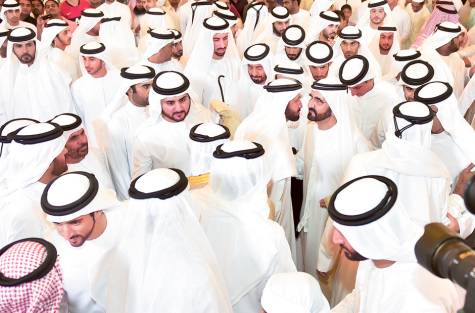
Abu Dhabi, Oct 5: UAE leaders performed Eid Al Adha prayers across the country on Saturrday.
In Dubai, His Highness Shaikh Mohammad Bin Rashid Al Matkoum, Vice-President and Prime Minister of the UAE and Ruler of Dubai, yesterday performed Eid Al Adha prayers at the Shaikh Rashid Mosque in Zabeel.
Also praying alongside Shaikh Mohammad were Shaikh Hamdan Bin Mohammad Bin Rashid Al Maktoum, Crown Prince of Dubai; Shaikh Hamdan Bin Rashid Al Maktoum, Deputy Ruler of Dubai and UAE Minister of Finance; and Shaikh Maktoum Bin Mohammad Bin Rashid Al Maktoum, Deputy Ruler of Dubai. A number of shaikhs, senior officials, dignitaries and scores of Emirati and expatriate worshippers also performed prayers alongside Shaikh Mohammad.
Shaikh Mohammad and the worshippers listened to a sermon delivered by Dr Omer Al Khatib, who urged Muslims to stick to good manners and do good deeds as per Islamic teachings.
Their Highnesses the Members of the Supreme Council and Rulers of the emirates led Eid prayers in their respective emirates.
In Abu Dhabi, General Shaikh Mohammad Bin Zayed Al Nahyan, Crown Prince of Abu Dhabi and Deputy Supreme Commander of the UAE Armed Forces, performed Eid prayers at Shaikh Zayed Grand Mosque in Abu Dhabi.
In Sharjah, His Highness Dr Shaikh Sultan Bin Mohammad Al Qasimi, Supreme Council Member and Ruler of Sharjah, performed Eid Al Adha prayers on Saturday at Al Badea’ Eid Musalla in Sharjah.
Also joining Shaikh Sultan in performing the Eid prayers were Shaikh Sultan Bin Mohammad Bin Sultan Al Qasimi, Crown Prince and Deputy Ruler of Sharjah; Shaikh Khalid Bin Abdullah Al Qasimi, Chairman of Sharjah Seaports and Customs Department; Shaikh Sultan Bin Ahmad Al Qasimi, Chairman of Sharjah Media Corporation; other shaikhs, senior officials and dignitaries as well as a crowd of worshippers.
In Ajman, His Highness Shaikh Humaid Bin Rashid Al Nuaimi, Supreme Council Member and Ruler of Ajman, performed Eid prayers at the Shaikh Rashid Bin Humaid Al Nuaimi Mosque in Ajman.
Shaikh Ammar Bin Humaid Al Nuaimi, Crown Prince of Ajman, Shaikh Ahmad Bin Humaid Al Nuaimi, Representative of Ajman Ruler for Financial and Administrative Affairs; Shaikh Abdul Aziz Bin Humaid Al Nuaimi, Chairman of the Tourism Development Department; Dr Shaikh Majid Bin Saeed Al Nuaimi, Chief of Emiri Court; a number of shaikhs, senior officials, citizens, and representatives of Arab and Muslim communities performed Eid prayers alongside Shaikh Humaid.
In Ras Al Khaimah, His Highness Shaikh Saud Bin Saqr Al Qasimi, Supreme Council Member and Ruler of Ras Al Khaimah, performed Eid Al Adha prayers at the Grand Eid Musalla in Khuzam.
Shaikh Mohammad Bin Saud Bin Saqr Al Qasimi, Crown Prince of Ras Al Khaimah, also offered Eid prayers along with Shaikh Saud.
A number of shaikhs, senior officials, UAE citizens and members of Arab and Islamic communities also performed Eid prayers.
In Umm Al Quwain, His Highness Shaikh Saud Bin Rashid Al Mualla, Supreme Council Member and Ruler of Umm Al Quwain, performed Eid prayers at Shaikh Zayed Mosque.
Shaikh Rashid Bin Saud Bin Rashid Al Mualla, Crown Prince of Umm Al Qaiwain, a number of shaikhs, senior officials and members of Arab and Muslim communities also performed the prayers along with the Ruler.
In Fujairah, His Highness Shaikh Hamad Bin Mohammad Al Sharqi, Supreme Council Member and Ruler of Fujairah, offered Eid Al Adha prayers at the Grand Eid Musallah in Fujairah, along with a host of worshippers.
Shaikh Mohammad Bin Hamad Bin Mohammad Al Sharqi, Crown Prince of Fujairah, and a number of shaikhs, top officials, heads of local and federal departments, dignitaries and a huge number of members of Arab and Islamic communities performed the prayers along with Shaikh Hamad.
In Al Ain, Shaikh Tahnoun Bin Mohammad Al Nahyan, Abu Dhabi Ruler's Representative in the Eastern Region, performed Eid prayers at Shiaab Al Ashkhar in Al Ain.
Shaikh Tahnoun was joined by Shaikh Sultan Bin Tahnoun Al Nahyan,





Comments
Add new comment